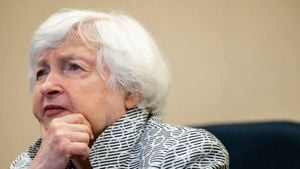Internal dynamics within the Labour Party have become increasingly intriguing as recent events signal significant shifts among its ranks. The atmosphere has been stirred by several high-profile resignations and departures, which have raised eyebrows and suggested potential rifts within the party.
A prime example is the recent exit of Paul Joyce, the mayor of Northampton. He announced his departure from the Labour Party to serve as an independent councillor following his deselection as the party's candidate for upcoming local elections. Serving as the town mayor, Joyce expressed his dissatisfaction with the party's recent decisions, stating, "I feel I’ve worked hard and decided... for the last four or five months, I would sit as an independent." This move highlights not only Joyce's frustrations but also hints at broader challenges the party faces at local governance levels.
The Labour group acknowledged Joyce’s contributions, calling his departure “sad news.” They noted his dedication to issues such as environmental protection and workers' rights during his nearly eight years of service on various councils, including the now-defunct Northampton Borough Council. Joyce is not just leaving the party; he's attempting to carve out his path, which may resonate with constituents who feel their concerns are not being adequately addressed by the mainstream party.
Encouragingly for Labour, though, this shift within its ranks isn't the only news surfacing recently; the party has also seen potential new blood stepping up to fill the gaps left by departing members. Discussions among community leaders are focused not only on how to maintain their political might but also on addressing underlying issues of governance and voting demographics.
Meanwhile, discussions surrounding party leadership have gained traction during party meetings, indicating uncertainty and contemplation among party officials. The push for reevaluation of party stance is palpable, especially against the backdrop of local concerns brought to light by constituents. This has prompted both activists and elected officials to reexamine their alignment with party policy, as well as the party’s broader political narrative.
Against this shifting backdrop, the party’s grassroots activism has also been emboldened, with many feeling it’s time for changes to reflect the modern socio-economic climate of the UK. Conversations on the ground reveal a desire for Labour to embrace its traditional roots of championing the underprivileged and to shift its focus back toward core working-class issues.
Locally, these changes are not just making waves; they're shaking the status quo, leading to greater discussions around socioeconomic disparity, housing, and healthcare, which are top concerns among voters. There are murmurs among factions within the party about the necessity for an overhaul of how Labour presents itself and relates to the electorate.
This introspection within Labour’s ranks is reflective of wider struggles faced by left-leaning parties globally, where the balance between traditional ideology and modern demands is increasingly difficult to navigate. It raises the question: can Labour adapt adequately to reclaim its influence, or will it continue to see its authority erode?
Interestingly, the situation isn’t entirely bleak for Labour. Regional wins and success stories across various constituencies suggest the party still holds substantial sway among electorate groups who prioritize social justice and economic equity. Yet, it remains unclear whether this support will translate to long-term loyalty as internal strife percolates.
Critics of the party have seized on these developments, perceiving them as indicative of systemic problems within Labour. Members of the media have emphasized the significance of these shifts, declaring them pivotal moments—although perspectives vary about the overall impact on future elections.
What remains clear is the desire among many within Labour to focus on actionable solutions rather than simply discussing theoretical frameworks. There's now an urgent call for unity and clear communication as the party strives to redefine itself for the coming electoral battles.
Labour's struggle is emblematic of political narratives seen across various parties worldwide, where transitions within parties often foreshadow larger electoral ramifications. The recent transitions are telling and may pave the way for new strategies as the party seeks to make meaningful connections with the electorate.
The evolution of the internal dynamics within Labour presents both challenges and opportunities. For some members, the recent departures may feel like setbacks; for others, they might signal the dawn of needed change. How Labour navigates this delicate corridor will be key to its survival and relevance moving forward.
With constituencies growing more diverse and their needs increasingly complex, the Labour Party must engage deep and meaningful conversations about identity, representation, and action. This transformation is not just necessary; it's imperative for sustaining the party’s long-term impact and continued relevance.
Looking forward, Labour is facing the ultimate question: can it realign itself to meet the expectations of both party members and the wider electorate? Only time will tell if these internal shifts can cultivate the kind of renewal needed for Labour to succeed.
For now, significant attention will be focused on how the party responds to the recent changes and what initiatives will roll out as they seek to stabilize claims of leadership and governance. The eyes are set on the upcoming periods, with Labour’s adaptability and resilience being tested like never before.



